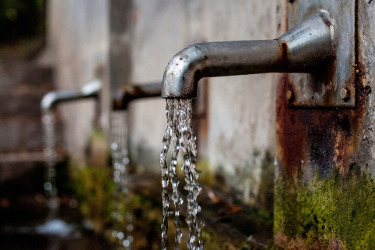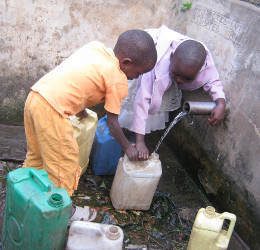
Vision and Mission
 Water security is essential to achieve SDG-6 and resilience to climate change requires that engineering will provide knowledge and technology, leading water governance and its efficient use.
Water security is essential to achieve SDG-6 and resilience to climate change requires that engineering will provide knowledge and technology, leading water governance and its efficient use.
Today, engineering urgently needs to have a stronger voice on the water scene, to remind society and politicians of the importance of its contribution. With this aim, the World Federation of Engineering Organizations established the Working Group on Water (WGoW) in October 2018. This Working Group was proposed and hosted by the Engineering Institute of Spain (IIE), with Mr. Tomás Sancho as chairman.
Once the activities of the WGoW were concluded, the WFEO General Assembly, held in Costa Rica in March 2022, approved the transformation of this Working Group into a Standing Technical Committee on Water (CW), also at the proposal of the IIE. The CW´s chairman is Mr. Ignacio González-Castelao Martínez-Peñuela.
WFEO, with the support of the CW, must acquire greater relevance in water global decisions, showing the society the importance of engineering to improve the living conditions of all mankind.
Objectives
Engineers need to provide a strong platform to coordinate the engineering water work around the world and so, WFEO will be able to make a significant contribution to reach the global water goals.
In 2015, 844 million people lacked even a basic water service, 2.1 billion people lacked safely managed drinking water, and 4.5 billion people worldwide lacked a safely managed sanitation service. More than 2 billion people are living in countries experiencing high water stress.
Engineering contributions will be essential to reach this target. Adapting to climate change is making the challenge even more difficult.
Engineers are needed to design and operate dams and reservoirs, channels, pipelines, water treatment plants, and also for planning and managing water resources. New nature-based engineering solutions are emerging to improve rivers, underground aquifers and urban drainage. Safe wastewater re-use and desalination will be needed as well. New irrigation technologies are needed as agriculture demands account for 70% of all water use.
Engineers are also needed to help prepare for floods and droughts to reduce economic losses from natural disasters.
Integrating information technology into water and sanitation systems offers exciting new solutions. Improved tracking of water flow and consumption can provide the improved security needed to attract private investment while still ensuring that reliable services meet basic human needs.
Activities
 Water has a well-established international dynamics with publications and recurring appointments (Global Conferences) in which we miss the specific engineering contribution, quite necessary to achieve real and effective goals.
Water has a well-established international dynamics with publications and recurring appointments (Global Conferences) in which we miss the specific engineering contribution, quite necessary to achieve real and effective goals.
CW activities shall be addressed to to give engineering a stronger voice in the water scene.
Among these activities are:
• Contributions to the SDG 6 and their goals through participation in UN Water Task Force Groups.
SDG 6 includes eight global targets that are universally applicable and aspirational. However, each government must decide how to incorporate them into national planning processes, policies and strategies based on national realities, capacities, levels of development and priorities. They cover the entire water cycle including: provision of drinking water (target 6.1) sanitation and hygiene services (target 6.2), treatment and reuse of wastewater and ambient water quality (target 6.3), water-use efficiency and scarcity (6.4), implement integrated water resources management at all levels, including through transboundary cooperation (target 6.5), protecting and restoring water-related ecosystems (6.6), international cooperation and capacity-building (target 6.A) and participation in water and sanitation management (target 6.B).
• Participation in international forums in which the water policy is conceived.
• Preparation of engineering positions and statements typical of engineering and Contribution to global documents of UN Water and their agencies (annual preparation), such as the yearly WWDR – World Water Development Report – .
This involves working on the various documents produced through participation in the corresponding Groups. Associations with specialized global organizations that are considered relevant for work will be established.
These activities will be developed in two ways:
• Collecting and disseminating the activities performed by different members of the WFEO and their professionals.
• Specific initiatives that can agree on the WGW, that require specific works to be developed by experts, which must have specific funding to be carried out.
Organization
The headquarters of the Standing Technical Committee on Water (CW) is hosted by the Engineering Institute of Spain (Madrid, Spain). The committee is integrated by:
• Chair: Mr. Ignacio González-Castelao Martínez-Peñuela (IIE).
• Vice-Chair: Mr. Armando Baptista da Silva Afonso (Ordem dos Engenheiros de Portugal).
• Executive Secretary: Nominated by the World Council of Civil Engineers (WCCE).
The CW Coordinating Committee includes the Chair, the Vice-Chair, the Executive Secretary, and each Specific Product Group (SPG) coordinator.
Specific Product Groups
The CW core should be reinforced with WFEO engineers from different disciplines and geographic locations. The basis will be the national members of WFEO. The creation of Specific Product Groups (SPGs) is proposed, in which at least three regions will be present, as water issues have different peculiarities in each area. The regions are:
• North America
• Latin America and the Caribbean
• Europe
• Africa
• Asia-Pacific
A Coordinator shall be appointed in each SPG, who will be integrated into the CW Coordination Committee.
Membership and Meetings
Each organization concerned can appoint a representative as a member of the CW, preferably a water expert.
For each specific initiative, the Coordinating Committee may appoint professionals of recognized prestige to be added to the corresponding works and professionals proposed by the WFEO member organizations.
The CW will hold one face-to-face meeting each year, normally at the same time as the WFEO annual meeting – Executive Council or General Assembly.
CW Coordination Committee will meet virtually.
Each SPG will have its own virtual meetings. Chair, Vice-Chair and Executive Secretary will be invited to attend them.
